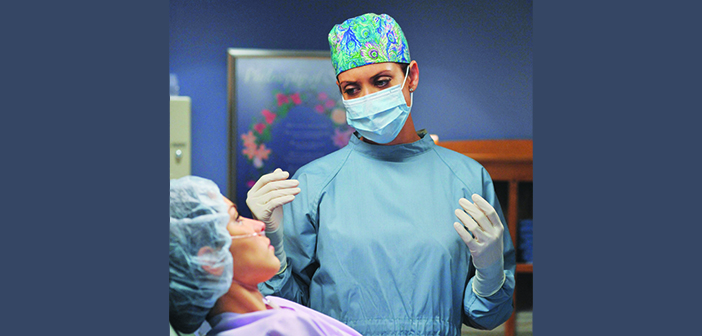TV shows allow premed students to ponder ethical dilemmas.
Is it ethically permissible for parents to refuse vaccinations for their children? The question prompted a heated debate after students in the course Primetime Bioethics watched an episode of the ABC show Private Practice in which a mother rejects a vaccine—and her son gets the measles (and, spoiler alert, ultimately dies). While some of the undergraduates argued that individual choice must always be prioritized, others said the safety of all should come before anything else.
The argument was just a taste of what many of these students will face as they continue their education. Their Program in Liberal Medical Education (PLME) course covers a wide variety of medical ethics questions, using TV shows as a jumping-off point. Topics include everything from designer babies to physician-assisted death. Every class period is focused on one issue, which centers the student-led presentation and theory-based class discussion.
“I’ve always liked philosophy. In medical school, I was the one who was excited whenever we did ethics,” says Deirdre Fearon MD’96 F’02 AM’04, an associate professor of emergency medicine and of pediatrics, who teaches the course. “I always wanted to do something like this, because I like to teach, I like medical ethics, and I watch these shows and the ethical dilemmas are usually not subtle in them. I thought it would be a fun way to teach and learn.”
Fearon got the chance to kick-start the idea in 2012 when Hailey Roumimper ’15 approached her to collaborate on an Undergraduate Teaching and Research Award (UTRA). Fearon didn’t have any ongoing research, so she and Roumimper created a basic curriculum for a course. When it was first offered two years later, it was an instant hit.
“It’s a great class,” Kevin Chen ’19 MD’23 says. “I like that we incorporate papers, articles, and fun TV shows in a more applied way.”
Each week, students watch one show around the given topic, read a few articles or papers, and write a response. A group of students creates that week’s presentation and leads the discussion. One week, when discussing vaccine refusal, students created a Mafia-like game for the entire class to demonstrate the concept of herd immunity.
“I love that each class is student run,” Sabrina Saeed ’19 says, because it makes it more exciting and engaging.
The subject matter is increasingly relevant for physicians, Fearon says. “I deal with ethics problems every day,” she says. “Every shift, something comes up.” She began including a “case of the week” in each class to get students thinking about real-world problems.
Students say they love getting to consider deeper topics in medicine. “Most premed classes are hard science,” Natasha Richmond ’20 says. “We can’t think about the bigger picture. This class gives us access to think about those ideas in a more relaxed setting.”
Fearon lets them make tough calls, in the safety of the classroom. “In medicine, we have to make hard decisions. Some people criticize bioethics because there is sometimes no single right answer. But we still have to thoughtfully choose a right answer for a given case,” she says. “We have to act. And we want to feel good about our decisions and be able to defend our choices.”




